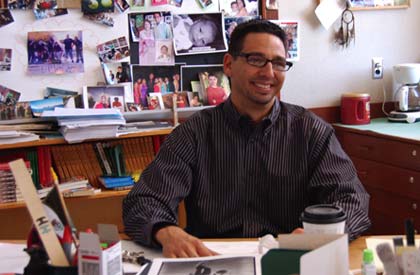[On Jan. 10, the governing board of Tucson schools voted to terminate the popular and enormously successful Mexican American Studies program, under pressure from the Arizona state superintendent of education. We have posted a number of updates on the attacks on this program, including a letter that Tucson teacher Curtis Acosta wrote recently, describing the impact on his curriculum. In this letter, Acosta continues the story. The Teacher Activist Group (TAG) network will soon launch a national solidarity campaign in support of the Mexican American Studies program. We will post details.]

Unfortunately, there has been little guidance and movement toward how my colleagues and I are to move forward in the development of brand new curriculum and the pedagogical changes that must be made. As I wrote to you all last week, anything from the Mexican American Studies perspective is now illegal for the former MAS teachers. We are being asked to use the district-adopted textbooks as the model for how to move forward. We have been told that we can still teach about race and sensitive topics, which is in contradiction to earlier direction from our school/site administrators, but we must be balanced and cannot reflect MAS perspectives, although this has yet to be defined.
In fact, Norma Gonzalez (one of my MAS colleagues) was specifically told that she “CANNOT teach or discuss in class anything that is specific towards the culture and background of Mexican American students.” This is an exact quote from her administrator. She was also asked to leave the middle school site that she is currently teaching and forced to abandon all her current students. Norma’s mere presence at her school is seen as unbearable to her administration regardless of her quality work, dedication to her classes and amazing relationships she creates with her students. This is the damage being displayed in our classrooms in order to fall in line with the political motivations behind destroying our program.
What is troubling for all of us is the fact that we have always been balanced, encouraged students to engage in critical thought, and embraced diverse voices and viewpoints throughout our curriculum and pedagogy. The direction from the district implies the opposite regardless of the many audits and observations that have proven otherwise.
To put this in a more concrete way, my classes were designed in a way that showed multiple perspectives and voices. Here is a short list of authors who are not Mexican that I use: Sherman Alexie, Jane Yolen, Junot Díaz, David Berliner, Angela Davis, Pat Buchanan, Ofelia Zepeda, Malcolm X, Maxine Hong Kingston, Jonathan Kozol, and Martin Luther King Jr.
This is critical since we see a common theme that administration across the district has told my colleagues and myself — we are all to avoid Mexican work and perspectives at all costs. However, these authors are a part of the same censored, banned, or illegal curriculum and this surely means we must abandon these authors and this curriculum, too. We are also forbidden to use the critical lenses to view the work which challenges students to develop academically credible arguments in order to support their own views.
Thus, when they tell us we may move forward and develop multicultural curriculum it feels like we are being set-up to fail. The district has been caught in so much double speak and contradictory language they have no idea how to move forward, and we have no confidence in trusting them as they give advice. As I have mentioned in other interviews I do not feel safe teaching The Tempest or “Beyond Vietnam” by Dr. King as I normally have for years, since it is clear that the district wants us to not only abandon the history and culture of Mexican Americans, but also the curriculum and pedagogy developed by Mexican American teachers. The only safe route appears for us to flee from any history or voices of color, authors that echo the themes that we had used in the past, and embrace curriculum that does not venture down those pathways. In other words, for my colleagues and I we must step back in the time machine to Pleasantville.
We are working without a net and there have been credible claims that two TUSD Governing Board members have told our district superintendent that any violations by teachers should be disciplined harshly and immediately. Thus, my colleagues and I feel that our jobs are very much on the line, and we have not been given any reassurance through specific criteria in curriculum and pedagogy of what is to be avoided and how we can confidently move forward with our students.
Yet our students remain dedicated to the restoration of the program and to have their voices heard. This week many of them participated in walkouts and an Ethnic Studies School was created for a day by the youth of UNIDOS, where many community members and professors from the University of Arizona donated their time to teach the youth. Above all else it is their education that matters, and this massive disruption in their lives and schooling is clear proof of how their futures have been dismissed and marginalized by local and state officials. The good news is that they are resilient and we all will continue to ensure that their future dreams are not compromised by the pettiness and spite of the tragic few that made this deplorable and shameful decision.
In Lak Ech,
Curtis Acosta
